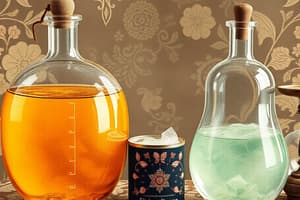Podcast
Questions and Answers
How is salad dressing an example of a mixture?
How is salad dressing an example of a mixture?
What is the main difference between mixtures and compounds?
What is the main difference between mixtures and compounds?
What is the purpose of centrifugation in separating mixtures?
What is the purpose of centrifugation in separating mixtures?
Why is it essential to understand the properties and interactions of mixtures?
Why is it essential to understand the properties and interactions of mixtures?
Signup and view all the answers
Which method can be used to separate a mixture by passing it through a porous material?
Which method can be used to separate a mixture by passing it through a porous material?
Signup and view all the answers
Which of the following is an example of a homogeneous mixture?
Which of the following is an example of a homogeneous mixture?
Signup and view all the answers
What can be classified as pure substances?
What can be classified as pure substances?
Signup and view all the answers
What are the two main categories of mixtures?
What are the two main categories of mixtures?
Signup and view all the answers
Which category of mixtures has components that are not uniformly distributed?
Which category of mixtures has components that are not uniformly distributed?
Signup and view all the answers
How can mixtures be defined?
How can mixtures be defined?
Signup and view all the answers
Study Notes
Unraveling the Puriness of Matter: An Exploration of Mixtures
On a serene Monday, February 5, 2024, as we ponder the question of whether the matter around us is "pure," we're compelled to dive deeper into the fascinating realm of chemistry. Our focus lies primarily on mixtures, which often make up the day-to-day substances we interact with.
Matter, in the context of this article, refers to the physical substances surrounding us, which can be classified into three categories: pure substances, mixtures, and compounds. Pure substances exist in their simplest, most elementary forms, such as elements (e.g., silver) and compounds (e.g., water).
However, the vast majority of matter we encounter in our daily lives is not pure. Instead, it's a mixture - a combination of two or more pure substances that can be separated into their original components.
Types of Mixtures
There are two main categories of mixtures:
-
Homogeneous Mixtures: These consist of a uniform distribution of two or more components. For example, pure drinking water and saltwater are homogeneous mixtures. Although these substances appear to be the same, they have different compositions and properties.
-
Heterogeneous Mixtures: These are made up of two or more components that are not uniformly distributed. Examples of heterogeneous mixtures include sand and pebbles, cotton balls and lint, or even a bowl of cereal with milk.
Mixtures are different from compounds in that they can be separated into their original components via physical means, such as filtration, evaporation, or centrifugation. In contrast, compounds are formed through chemical reactions and are held together by covalent or ionic bonds.
Separating Mixtures
As we go about our daily lives, we encounter various mixtures, such as:
- Salad dressing: a mix of oil, vinegar, and seasonings
- Beach sand: a blend of various minerals and rock fragments
- Air: a mixture of gases (oxygen, nitrogen, and other trace gases)
These mixtures can be separated through different methods, such as:
- Filtration: Separating a mixture by passing it through a porous material (e.g., coffee filter paper) that allows the liquid to pass through, but not the solid particles (e.g., coffee grounds).
- Evaporation: Removing a liquid from a mixture by heating it to the point that it evaporates, leaving behind the less volatile components (e.g., heating a saltwater solution).
- Centrifugation: Separating a mixture by spinning it in a centrifuge, which causes the heavier components to settle at the bottom (e.g., separating cream from milk).
Now that we've established the prevalence of mixtures in our daily lives and the methods used to separate them, we can conclude that the matter around us is rarely pure. Instead, the substances that surround us are often mixtures, sometimes consisting of thousands of different components.
Understanding the properties and interactions of these mixtures is essential for our everyday lives, and it's this knowledge that allows us to harness their potential in countless applications.
Studying That Suits You
Use AI to generate personalized quizzes and flashcards to suit your learning preferences.
Description
Delve into the fascinating realm of chemistry and explore the concept of mixtures, which are a combination of two or more pure substances that can be separated into their original components. Learn about the types of mixtures, such as homogeneous and heterogeneous mixtures, and the methods used to separate them.




